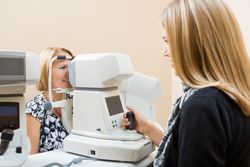
When you have diabetes, keeping blood sugars stable, eating healthy, and exercising are all ways to protect your eyes from a variety of ocular diseases. Annual eye exams are also essential, as they allow specialists to identify diseases in their earlier stages, when they are most responsive to treatment. But despite the vision-saving benefits of these check-ups, statistics suggest that more than half of diabetics fail to schedule yearly optometrist visits. Motivated to improve this trend, EyeOptics Optometry Center in Elk Grove, CA, explains what diabetes does to the eyes—and how routine exams and glaucoma tests can help.
3 Ways Diabetes Can Damage the Eyes
Glaucoma
Although the connection remains unclear, research estimates that individuals with diabetes are 40% more likely to develop glaucoma than people without diabetes. This condition is characterized by increased pressure within the eye that places stress on the optic nerve, resulting in vision loss and pain. But since these symptoms can take a long time to develop, it’s critical for people with diabetes to get glaucoma tests every year.
 Glaucoma tests, or tonometry tests, direct a stream of air into the eye to measure pressure. If the levels are elevated, there are several ways to treat the condition—such as laser surgery, oral medications, and prescription eye drops.
Glaucoma tests, or tonometry tests, direct a stream of air into the eye to measure pressure. If the levels are elevated, there are several ways to treat the condition—such as laser surgery, oral medications, and prescription eye drops.
Retinopathy
Diabetic retinopathy is a gradual eye disease that occurs when high blood sugar damages vessels within the eye. As blood vessel damage progresses, fluids can leak into the retina and cause it to swell. Initial signs include blurriness, dark spots, and recurrent floaters in one’s field of vision. When left untreated, diabetic retinopathy will eventually cause blindness.
Optometrists can screen for diabetic retinopathy using digital imaging technology to photograph the patient’s retina. These images reveal close-up details of blood vessels, allowing vision specialists to monitor the progress of the disease. If caught early enough, further damage may be delayed with the use of laser surgery and prescription medications.
Cataracts
Cataracts develop when proteins accumulate within the lens, causing the eye to appear cloudy. This condition is closely connected to diabetes because high blood sugar levels stimulate the production of sorbitol—a protein that can contribute to cataracts.
If cataracts do not cause vision problems, treatment may not be necessary. In cases where vision loss is present, optometrists may use advanced surgical tools to carefully remove a layer of the lens to eliminate the cataract.
Whether you’re due for an eye exam or have experienced a recent change in vision, EyeOptics Optometry Center provides the comprehensive care you need to defend against eye disease. Treating patients of all ages and backgrounds, this team of Elk Grove, CA optometrists has all the resources necessary to screen for retinopathy and perform cataract and glaucoma tests. This clinic will also simplify the exam process by making it as comfortable, convenient, and cost-effective as possible. Visit this vision center online to learn more about their services or call (916) 684-6688 to schedule your checkup.
About the Business
Have a question? Ask the experts!
Send your question

